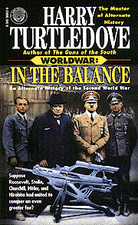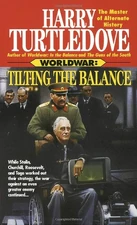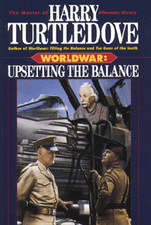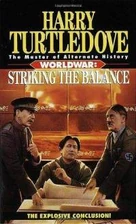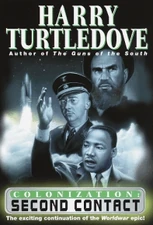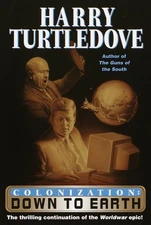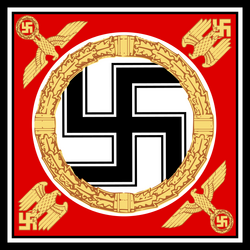
"Führer" was the title granted by German Chancellor Adolf Hitler to himself by law in 1934. The new position, fully named Führer und Reichskanzler ("Leader and Chancellor of the (Third) Reich"), unified the offices of President and Chancellor, formally making Hitler Germany's Head of State as well as Head of Government respectively; in practice, the Dictator of the Nazi German Reich.
For military matters, Hitler used the style Führer und Oberster Befehlshaber der Wehrmacht ("Leader and Supreme Commander of the Wehrmacht"), until that addition was dropped by decree of the Führer. The style of the Head of State for use in foreign affairs was Führer und Reichskanzler ("Leader and National Chancellor") until it was changed to Führer des Grossdeutschen Reichs ("Leader of the Greater German Nation").
The title fell into disuse immediately upon Hitler's death in 1945.
Literary Comment
Harry Turtledove has depicted the continued use of the title Führer in several timelines. In Worldwar, Hitler's successors used the title Führer und Reichskanzler throughout the remainder of the series. In In the Presence of Mine Enemies, Hitler's successors used the title Führer des Grossdeutschen Reichs or simply, Führer, implying that the office of chancellor had gone defunct.
In the Presence of Mine Enemies
Between 1934 and 2011, the Reich saw five führers. Otto von Bismarck was given honorary status posthumously.
| Führer | Number | Term |
| Adolf Hitler | 1 | 1934-196? |
| Heinrich Himmler | 2 | 196?-1985 |
| Kurt Haldweim | 3 | 1985-2010 |
| Heinz Buckliger | 4 | 2010-2011 |
| Odilo Globocnik | * | 24 hours in June 2011 |
| Heinz Buckliger | 4 | 2011-20?? |
- In 2011, the reform-minded Heinz Buckliger was temporarily overthrown during a putsch launched by Reichsführer-SS Lothar Prützmann. Odilo Globocnik held the position for about 24 hours until the putsch was defeated and Buckliger was reinstalled.
Worldwar
Between 1934 and 1966, four men are known to have held the office of Führer and Chancellor of Germany.
| Führer and Chancellor | Number | Term |
| Adolf Hitler | 1 | 1934-195? |
| Heinrich Himmler | 2 | 195?-1965 |
| Ernst Kaltenbrunner | 3 | 1965 |
| Walter Dornberger | 4 | 1965-1980(?) |
| Unknown | 5-? | 1980-2031 |
Heinrich Himmler died unexpectedly in 1965, while in the midst of planning an attack of Race-controlled Poland. His successor, Ernst Kaltenbrunner, initiated Himmler's plan leading to a brief war that year, which saw the death of Kaltenbrunner, and the ascension of the moderate Walter Dornberger, essentially the last senior official still alive.
Note
Turtledove never addresses how long Dornberger held the position and who succeeded him after his death.
Other Führers
Adolf Hitler is or was the Führer of the Greater German Reich in the vast majority of Harry Turtledove works based in World War II, including, but not limited to, "Cayos in the Stream", "The Eighth-Grade History Class Visits the Hebrew Home for the Aging", Joe Steele (both novel and short story), "The Last Article", and "Must and Shall". His role in these stories is usually limited to references. Hitler is also the only Führer identified by name in "Shtetl Days". As he is referred to as the "First Führer", implicitly, he had successors in that office.
Hitler is the only Führer of Germany in The War That Came Early series. He is assassinated in a military coup in April, 1944, and his successor, Heinz Guderian, does not use the title.
In "Ready for the Fatherland", Erich von Manstein takes control of Germany after killing Hitler in 1943, although for how long and whether or not he called himself führer is not addressed.
See Also
- German Emperor, the head of state of Germany from 1871 to 1918 in OTL. Turtledove has presented nearly as many alternate versions of this office as he has of the führer.
- Duce, an Italian title meaning "boss" or "leader" used by Benito Mussolini during most of his term as prime minister of Italy, and in his capacity as the head of state of the short-lived Italian Social Republic. Hitler and other fascist leaders adopted Mussolini's model, styling themselves as "leaders" of their respective countries. In the novel In the Presence of Mine Enemies, Mussolini's successors officially adopted the title "Duce" and continued to use it well into the 21st Century.
- Caudillo, a Spanish word also meaning "leader". While the word was used throughout the Spanish-speaking world for centuries, Spanish leader Francisco Franco adopted the title during his rule over Spain, cementing the word's association with fascism. In the novel In the Presence of Mine Enemies, Franco's successors continued to use the title "Caudillo" into the 21st Century.
- Poglavnik, a Croatian title meaning "head" or "chief". It was actually barely used until the 1930s, when the fascist Ustaše was formed. In OTL, the only person to hold the title was Ante Pavelić. In "Ready for the Fatherland" and the novel In the Presence of Mine Enemies, Pavelić's successors continued to use the title "Poglavnik" for decades after.
| |||||||||||||||||||
| ||||||||||||||||
| |||||||||||||||||||||||||






